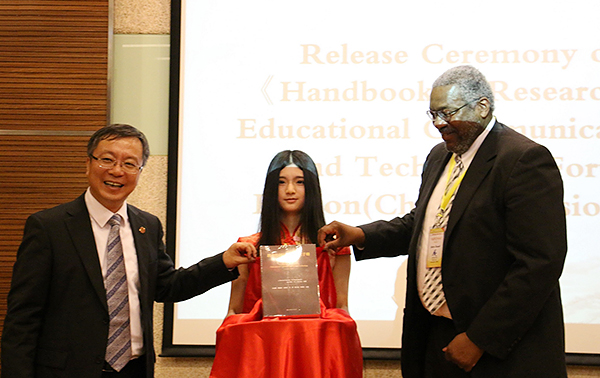Scholars stress openness in future educational development

Ren Youqun, vice-president of East China Normal University, and Robert Branch, president-elect of the Association for Educational Communications and Technology, attend the launch ceremony for the fourth edition of the Handbook of Research on Educational Communications and Technology in Chinese.
Chinese and American educators shared their visions for the future of learning in the digital age at the Summer Workshop of the Association for Educational Communications and Technology held at East China Normal University in Shanghai on June 17. Under the theme of “Learning and Knowledge Analysis in Open Education,” the event promoted in-depth discussion on massive open online courses (MOOCs), application of new media and techniques, and learning models.
“MOOCs pass knowledge to learners, but should complement with traditional teaching approaches, including teacher-student interactions and experimental courses. Integration of traditional courses and MOOCs is the best educational model for society,” said Ren Youqun, vice-president of East China Normal University.
“If openness can be greatly stressed, education will develop in a better direction in the future,” said David Wiley, a professor from Brigham Young University, adding that openness fosters innovation among individuals and organizations.
Over the past two decades, teaching models have undergone significant changes. Robert Reiser, associate dean for research at Florida State University, said that these changes are mainly reflected in two aspects: the emergence of new ideas in the process of teaching and learning, including the development of learning science and further emphasis on informal learning; and the influence of technical utilization on learning and teaching, including the expanding application of online learning skills, social media, educational games and mobile learning devices.
There are millions of online learners, the bulk of whom learn from open online courses taught by academics. Curtis Bonk, a professor from Indiana University, said that given these circumstances, it is necessary to explore the learning experience of autonomous learners, including obstacles, motivations and achievements. “The aforementioned learning experience will attract more learners to engage in open online courses,” he said.
The workshop was hosted by the association and jointly sponsored by Indiana University and East China Normal University.

 PRINT
PRINT CLOSE
CLOSE